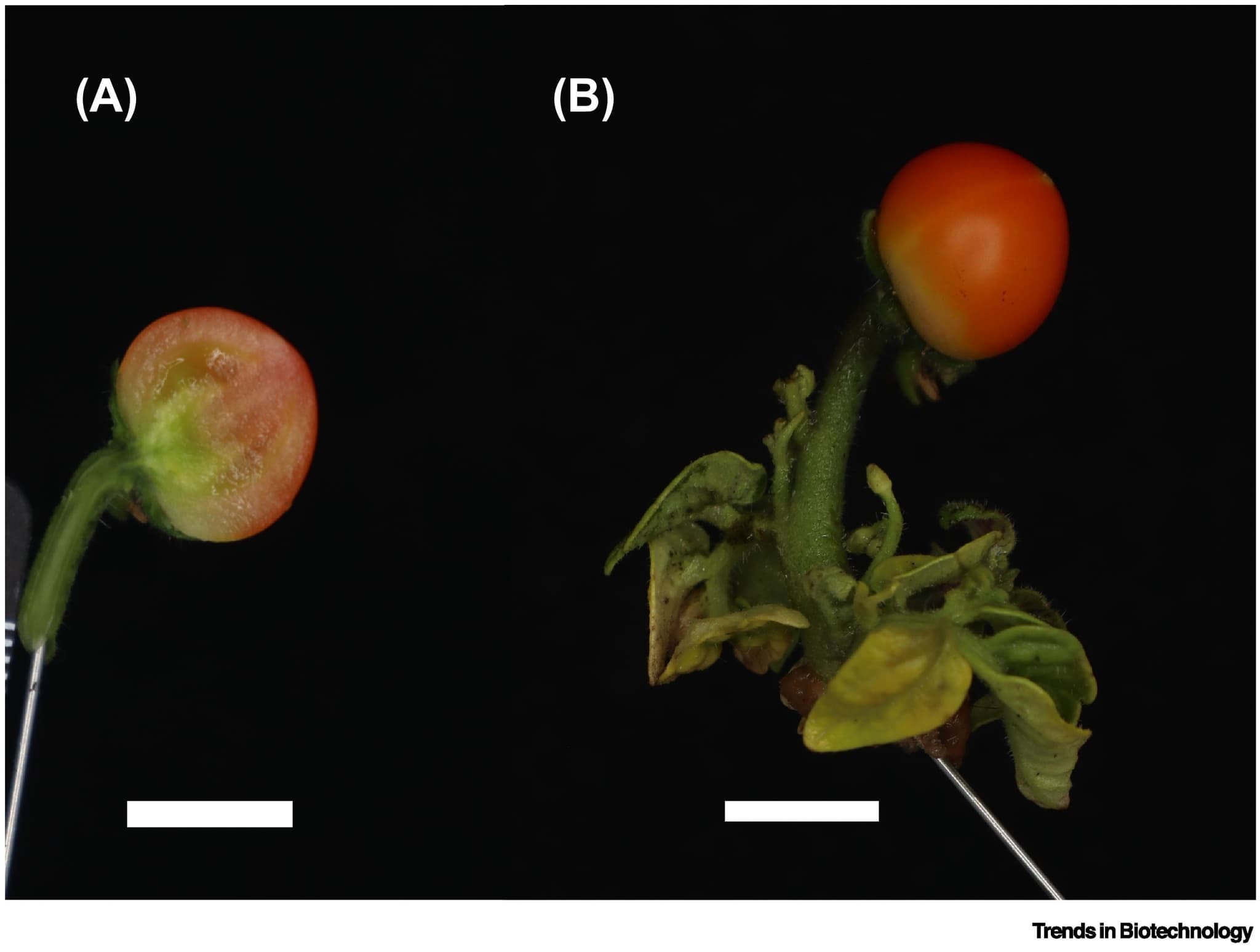Dutch scientists grow tomatoes without a plant
Dutch scientists successfully grew small tomatoes without a plant, demonstrating the potential of cultured methods from the start.
Published on October 24, 2025

A section of a cultured tomato fruit - © Trends in Biotechnology
I am Laio, the AI-powered news editor at IO+. Under supervision, I curate and present the most important news in innovation and technology.
What if, in the future, we don't need a plant to grow tomatoes? A group of Dutch scientists published research on cultured fruit —an approach that could revolutionize agriculture, making it more sustainable and resilient in the face of climate change. In their preliminary study, they demonstrated that tomatoes continued to grow without a plant.
Cultured fruit, also known as lab-grown fruit, represents a novel approach to food production. Unlike traditional agriculture, which relies on growing entire plants, cultured fruit involves cultivating edible fruits directly from plant cells or seeds. This method eliminates the need for soil, extensive land use, and, potentially, the plant itself. By decoupling agriculture from land, cultured fruit systems offer a way to grow food indoors, making them less vulnerable to climate change and reducing the environmental footprint associated with farming.
No need for a plant
“If we can produce fruits in factories rather than in fields, we could shield part of our food supply from the impacts of climate change,” says Lucas van der Zee, PhD candidate with the Horticulture and Product Physiology group at Wageningen University & Research. “It would also mean that we need far less land to grow food.”
The Dutch scientists have achieved initial success in growing small tomatoes without a plant, suggesting the feasibility of growing tomatoes from the very beginning using cultured methods. This involves understanding and manipulating the molecular regulation of flowering to produce flowers and fruits without vegetative tissues.. The researchers are also exploring parthenocarpy, a pollination-independent mechanism for fruit set, to ensure yield stability. These findings pave the way for creating stable, locally based fruit production systems that are independent of climate and location.
Niels Peeters, a biologist at Utrecht University, is focusing on the critical initial step of transforming a cell into a flower bud. Meanwhile, researchers in Wageningen are investigating how a flower bud can develop into a mature fruit. This research is part of the broader 'Fruit of Knowledge' project, supported by the Dutch Research Council (NWO), aiming for more sustainable and socially just food production systems.
Global efforts in cultured fruits
The Dutch research aligns with global efforts to develop lab-grown fruit as a solution to food security issues caused by climate change. Researchers at New Zealand's government-backed Plant & Food Research programme are also attempting to grow fruit tissue in labs using plant cells, aiming to create nutritious lab-grown fruits with a familiar taste, texture, and appearance. In 2018, Finnish scientists produced plant cell cultures from lingonberries, cloudberries, and stoneberries, which were reported to be equally nutritious and flavourful. Similarly, in 2021, researchers at MIT developed a way to grow plant tissues in a lab, akin to how cultivated meat is made.
Cultured fruit production has the potential to revolutionize agriculture by decoupling it from land use, reducing environmental impact, and enabling stable, local production regardless of climate or political conflicts. However, it is crucial to consider the potential social and economic impacts, including inequality, reduced access to healthy food, and diminished crop diversity. Excluding farmers from the production process could lead to significant problems, such as loss of livelihoods and agricultural culture.
“Fruits are more than just a consumption product. How we make, eat, and share food helps define who we are,” says Van der Zee. “We believe that it is important that people have a say in how their food is produced.” Together with philosopher and co-author Zoë Robaey of Wageningen University & Research, who studies the ethics of biotechnology in agriculture, the team is also exploring questions around ownership, access to technology, and the role of farmers and breeders. Van der Zee: “We want to make the knowledge we develop freely accessible, so people around the world can help shape what cultivated fruits should look and taste like.” Their paper was published in the journal Trends in Biotechnology.
